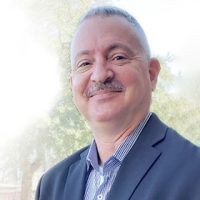Expert Panel:

Dr. William Wierda, President & CEO, CLL Global Research Foundation

Dr. Patrick Reville, Assistant Professor in the Department of Leukemia at The University of Texas MD Anderson Cancer Center

Jeff Folloder, Moderator and CLL patient advocate
Our recent CLL Global Research Foundation virtual town hall featured CLL Global President, Dr. William Wierda, and Dr. Patrick Reville, Assistant Professor in the Department of Leukemia at The University of Texas MD Anderson Cancer Center. CLL patient advocate Jeff Folloder moderated the event. Watch the full webinar.
Transcript
Jeff Folloder:
This comes in from Barbara. Barbara wants to know, “Is CLL now a treatable disease, just like diabetes?”
Dr. Patrick Reville:
I think it’s a bit of a difficult question to answer. I think yes, it’s a very treatable disease. I would not necessarily liken it to diabetes in the sense that I still think that it requires a lot of attention, especially early on. And so it is something that I think requires a lot of back-and-forth, both between the patients and the physicians and the healthcare teams that are managing it.
I think the treatments that we’re using to manage CLL and the way that we think about CLL really requires still a decent amount of expertise, and so is something that is particularly managed by experts in the field.
Whereas I think in terms of diabetes, again, they’re both chronic conditions. I think the outcomes, though, are a bit different between the diseases. So, sort of yes and no, I guess.
Dr. William Wierda:
That’s interesting. I had a long discussion yesterday with Tom Kipps, Dr. Kipps at UCSD about this, and we’re putting together a perspective paper, several of us, on cure of CLL and what does that mean.
And in our conversation, Tom and I had, sort of he struggles with the introductory that Dr. Tait Shanafelt and I wrote about cure and what does it mean to have a cure, and what is a cure, and is cure important or is it as important to transition into a situation where you can manage the disease long-term.
So, I mean, I would agree with what Patrick is saying. I didn’t like the analogy of diabetes with CLL, where we’re at with CLL now, because they’re different illnesses and different concepts apply.
I would say that for many, probably most of our patients with CLL, their lifespan is probably not shortened by their diagnosis of CLL, even if they need treatment.
Now, they can have infections, they can have second cancers, they may need treatment for their disease. But by and large, we have agents now that we can control the disease for their lifespan and not anticipate a shortened lifespan because of their disease that’s uncontrolled.
There are some patients that develop resistance that are high risk that we struggle with still, but that’s a smaller fraction than it used to be, certainly when we had only chemotherapy to treat.

